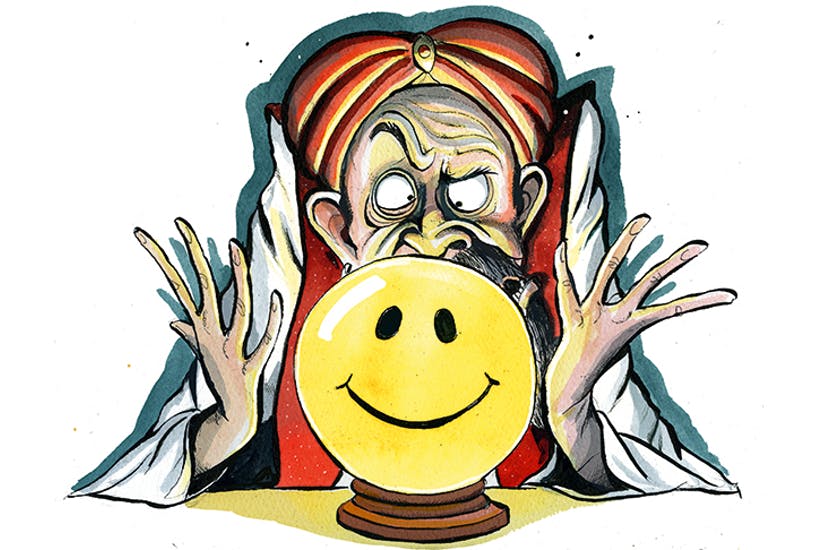Let nobody tell you that the second decade of the 21st century has been a bad time. We are living through the greatest improvement in human living standards in history. Extreme poverty has fallen below 10 per cent of the world’s population for the first time. It was 60 per cent when I was born. Global inequality has been plunging as Africa and Asia experience faster economic growth than Europe and North America; child mortality has fallen to record low levels; famine virtually went extinct; malaria, polio and heart disease are all in decline.
Little of this made the news, because good news is no news. But I’ve been watching it all closely. Ever since I wrote The Rational Optimist in 2010, I’ve been faced with ‘what about…’ questions: what about the great recession, the euro crisis, Syria, Ukraine, Donald Trump? How can I possibly say that things are getting better, given all that? The answer is: because bad things happen while the world still gets better. Yet get better it does, and it has done so over the course of this decade at a rate that has astonished even starry-eyed me.
Perhaps one of the least fashionable predictions I made nine years ago was that ‘the ecological footprint of human activity is probably shrinking’ and ‘we are getting more sustainable, not less, in the way we use the planet’. That is to say: our population and economy would grow, but we’d learn how to reduce what we take from the planet. And so it has proved. An MIT scientist, Andrew McAfee, recently documented this in a book called More from Less, showing how some nations are beginning to use less stuff: less metal, less water, less land. Not just in proportion to productivity: less stuff overall.
This does not quite fit with what the Extinction Rebellion lot are telling us. But the next time you hear Sir David Attenborough say: ‘Anyone who thinks that you can have infinite growth on a planet with finite resources is either a madman or an economist’, ask him this: ‘But what if economic growth means using less stuff, not more?’ For example, a normal drink can today contains 13 grams of aluminium, much of it recycled. In 1959, it contained 85 grams. Substituting the former for the latter is a contribution to economic growth, but it reduces the resources consumed per drink.

As for Britain, our consumption of ‘stuff’ probably peaked around the turn of the century — an achievement that has gone almost entirely unnoticed. But the evidence is there. In 2011 Chris Goodall, an investor in electric vehicles, published research showing that the UK was now using not just relatively less ‘stuff’ every year, but absolutely less. Events have since vindicated his thesis. The quantity of all resources consumed per person in Britain (domestic extraction of biomass, metals, minerals and fossil fuels, plus imports minus exports) fell by a third between 2000 and 2017, from 12.5 tonnes to 8.5 tonnes. That’s a faster decline than the increase in the number of people, so it means fewer resources consumed overall.
If this doesn’t seem to make sense, then think about your own home. Mobile phones have the computing power of room-sized computers of the 1970s. I use mine instead of a camera, radio, torch, compass, map, calendar, watch, CD player, newspaper and pack of cards. LED light bulbs consume about a quarter as much electricity as incandescent bulbs for the same light. Modern buildings generally contain less steel and more of it is recycled. Offices are not yet paperless, but they use much less paper.
Even in cases when the use of stuff is not falling, it is rising more slowly than expected. For instance, experts in the 1970s forecast how much water the world would consume in the year 2000. In fact, the total usage that year was half as much as predicted. Not because there were fewer humans, but because human inventiveness allowed more efficient irrigation for agriculture, the biggest user of water.
Child mortality has fallen to record low levels; famine virtually went extinct
Until recently, most economists assumed that these improvements were almost always in vain, because of rebound effects: if you cut the cost of something, people would just use more of it. Make lights less energy-hungry and people leave them on for longer. This is known as the Jevons paradox, after the 19th-century economist William Stanley Jevons, who first described it. But Andrew McAfee argues that the Jevons paradox doesn’t hold up. Suppose you switch from incandescent to LED bulbs in your house and save about three-quarters of your electricity bill for lighting. You might leave more lights on for longer, but surely not four times as long.
Efficiencies in agriculture mean the world is now approaching ‘peak farmland’ — despite the growing number of people and their demand for more and better food, the productivity of agriculture is rising so fast that human needs can be supplied by a shrinking amount of land. In 2012, Jesse Ausubel of Rockefeller University and his colleagues argued that, thanks to modern technology, we use 65 per cent less land to produce a given quantity of food compared with 50 years ago. By 2050, it’s estimated that an area the size of India will have been released from the plough and the cow.
Land-sparing is the reason that forests are expanding, especially in rich countries. In 2006 Ausubel worked out that no reasonably wealthy country had a falling stock of forest, in terms of both tree density and acreage. Large animals are returning in abundance in rich countries; populations of wolves, deer, beavers, lynx, seals, sea eagles and bald eagles are all increasing; and now even tiger numbers are slowly climbing.
Perhaps the most surprising statistic is that Britain is using steadily less energy. John Constable of the Global Warming Policy Forum points out that although the UK’s economy has almost trebled in size since 1970, and our population is up by 20 per cent, total primary inland energy consumption has actually fallen by almost 10 per cent. Much of that decline has happened in recent years. This is not necessarily good news, Constable argues: although the improving energy efficiency of light bulbs, aeroplanes and cars is part of the story, it also means we are importing more embedded energy in products, having driven much of our steel, aluminium and chemical industries abroad with some of the highest energy prices for industry in the world.
In fact, all this energy-saving might cause problems. Innovation requires experiments (most of which fail). Experiments require energy. So cheap energy is crucial — as shown by the industrial revolution. Thus, energy may be the one resource that a prospering population should be using more of. Fortunately, it is now possible that nuclear fusion will one day deliver energy in minimalist form, using very little fuel and land.
Since its inception, the environmental movement has been obsessed by finite resources. The two books that kicked off the green industry in the early 1970s, The Limits to Growth in America and Blueprint for Survival in Britain, both lamented the imminent exhaustion of metals, minerals and fuels. The Limits to Growth predicted that if growth continued, the world would run out of gold, mercury, silver, tin, zinc, copper and lead well before 2000. School textbooks soon echoed these claims.
This caused the economist Julian Simon to challenge the ecologist Paul Ehrlich to a bet that a basket of five metals (chosen by Ehrlich) would cost less in 1990 than in 1980. The Stone Age did not end for lack of stone, Simon said, arguing that we would find substitutes if metals grew scarce. Simon won the bet easily, although Ehrlich wrote the cheque with reluctance, sniping that ‘the one thing we’ll never run out of is imbeciles’. To this day none of those metals has significantly risen in price or fallen in volume of reserves, let alone run out. (One of my treasured possessions is the Julian Simon award I won in 2012, made from the five metals.)
A modern irony is that many green policies advocated now would actually reverse the trend towards using less stuff. A wind farm requires far more concrete and steel than an equivalent system based on gas. Environmental opposition to nuclear power has hindered the generating system that needs the least land, least fuel and least steel or concrete per megawatt. Burning wood instead of coal in power stations means the exploitation of more land, the eviction of more woodpeckers — and even higher emissions. Organic farming uses more land than conventional. Technology has put us on a path to a cleaner, greener planet. We don’t need to veer off in a new direction. If we do, we risk retarding progress.
As we enter the third decade of this century, I’ll make a prediction: by the end of it, we will see less poverty, less child mortality, less land devoted to agriculture in the world. There will be more tigers, whales, forests and nature reserves. Britons will be richer, and each of us will use fewer resources. The global political future may be uncertain, but the environmental and technological trends are pretty clear — and pointing in the right direction.






Comments